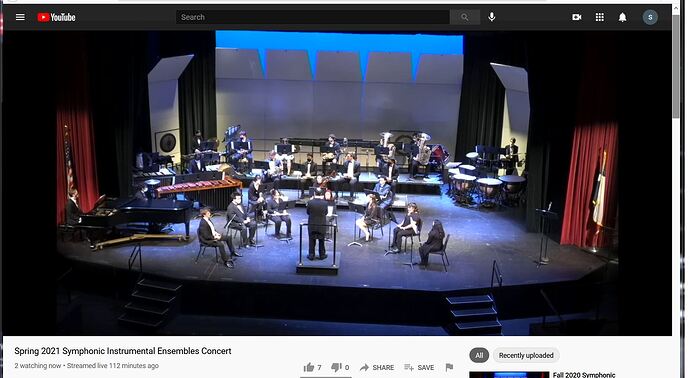ASSOCIATE OF ARTS DEGREE WITH A FIELD OF STUDY IN MUSIC
This plan is an official Field of Study Degree approved
by the Texas Higher Education Coordinating Board.
Offered on All Campuses
Degree Code: AA.FS.MUSIC.14
This degree plan is designed to meet the needs of students who plan to major in Music and transfer to a four-year college/university. This curriculum applies to the Bachelor of Music degree, but also may be applied to the Bachelor of Arts or other baccalaureate-level music degree as deemed appropriate by the awarding institution. The field of study in music included in this degree is approved by the Texas Higher Education Coordinating Board. This degree plan will constitute a 60-semester-credit-hour transfer block to any public Texas four-year college or university.
Transferring students who have completed the field of study curriculum must satisfy the competency and proficiency requirements of the receiving institution. Transferring students shall not be required to repeat courses transferred as part of the field of study curriculum. However, diagnostic assessment of transfer students is permissible if the receiving institution routinely conducts diagnostic assessment of native students at the same point in the Program of Study.
Completion of the field of study curriculum shall not prevent a receiving institution from requiring additional lower-division courses that may be necessary for specific degree programs. Receiving institutions may require transfer students in specialized programs (e.g., jazz studies, performance, composition, music therapy, etc.) to take additional degree-specific lower-division courses that are not included in the field of study curriculum. Receiving institutions are not required to accept a grade below “C” in transfer.
In order to be eligible to receive this A.A. degree, a student must:
- Complete a minimum of 60 credit hours including all the required courses listed;
- Earn a grade of “C” or better in English 1301 and the selected college-level mathematics course;
- Receive a GPA (2) of at least 2.00 (“C”);
- Meet all Texas Success Initiative (TSI) requirements and course prerequisites; and
- Complete at least 25% of the credit hours required for graduation through instruction by Dallas College.
Students who plan to transfer must work closely with an advisor/counselor and music coordinator at the college.
This degree does not include all Core course requirements.
Courses Required for the A.A. Degree with a Field of Study in Music
Component Areas
and CB Codes Courses Semester-Credit Hours Required
Communication
(CB010) Select EACH of the following:
ENGL 1301 (a grade of “C” or better is required)
ENGL 1302 6
Mathematics
(CB020) Select ONE of the following:
(A grade of “C” or better is required.)
MATH 1314, 1316, 1324, 1325, 1332, 1342, 1350, 1414, 1442, 2412, 2413, 2414 3-4
Life and Physical Sciences
(CB030) Select ONE of the following:
ANTH 2401, BIOL 1406, 1407, 1408, 1409, 1411, 2401, 2402, 2406, 2416, 2420, 2421CHEM 1405, 1406, 1407, 1411, 1412, 2423, 2425ENVR 1401, 1402GEOL 1401, 1402, 1403, 1404, 1405, 1445, 1447PHYS 1401, 1402, 1403, 1404, 1405, 1407, 1415, 1417, 2425, 2426 4
Creative Arts
(CB050) Select the following:
MUSI 1307 3
American History
(CB060) Select the following:
HIST 1301
and
Select ONE of the following:
HIST 1302, 2301, 2328, 2381 6
Government/Political Science
(CB070) Select EACH of the following:
GOVT 2305, 2306 6
Component Area Option
(CB090) Select ONE of the following options:
Option A: SPCH 1311, 1315, 1321 or SGNL 1301, 1302 and PHED 1164
OR
Option B: FOREIGN LANGUAGE - ARAB 1411, 1412; CHIN 1411, 1412; FREN 1411, 1412; GERM 1411, 1412; ITAL 1411, 1412; JAPN 1411, 1412; KORE 1411, 1412; PORT 1411, 1412; RUSS 1411, 1412; SPAN 1411, 1412 4
CORE CREDIT HOURS FOR THIS A.A. DEGREE 32
REQUIRED MUSIC ENSEMBLE FIELD OF STUDY COURSES
Select FOUR semester hours from the following:
MUEN 1121, 1122, 1123, 1131, 1132, 1133, 1134, 1135, 1136, 1137, 1151, 1152, 1153, 2123, 2141
(Courses may be repeated for credit.) 4
APPLIED STUDY
I. Select EIGHT (8) semester hours in the major applied area of study of the following:
MUAP 1101, 1105, 1109, 1113, 1115, 1117, 1121, 1125, 1129, 1133, 1137, 1141, 1145, 1149, 1153, 1157, 1158, 1161, 1165, 1169, 1177, 1181, 2201, 2205, 2209, 2213, 2215, 2217, 2221, 2225, 2229, 2233, 2237, 2241, 2245, 2249, 2253, 2257, 2258, 2261, 2265, 2269, 2277, 2281
(Courses may be repeated for credit.)
II. Applied/class piano
MUSI 1181, 1182, 2181, 2182; MUAP 1169, 2269, 2369 8
THEORY/AURAL SKILLS
Select EACH of the following:
MUSI 1116, 1117, 1311, 1312, 2116, 2117, 2311, 2312 16
TOTAL CREDIT HOURS REQUIRED FOR THIS A.A. DEGREE 60
Note: State universities are required to accept only 60 hours in transfer; therefore, it is strongly suggested that students check with their receiving university regarding the acceptance of any credit hours over the 60-credi-hour maximum. Students may have to make a choice between completing the Field of Study or the degree.
Student’s transcript will indicate the Field of Study has been completed upon successful completion of the following courses:
Four (4) semester hours from MUEN 1121, 1122, 1123, 1131, 1132, 1133, 1134, 1135, 1136, 1137, 1151, 1152, 1153, 2123, 2141
Eight (8) semester hours from MUAP 1101, 1105, 1109, 1113, 1115, 1117, 1121, 1125, 1129, 1133, 1137, 1141, 1145, 1149, 1153, 1157, 1158, 1161, 1165, 1169, 1177, 1181, 2201, 2205, 2209, 2213, 2215, 2217, 2221, 2225, 2229, 2233, 2237, 2241, 2245, 2249, 2253, 2257, 2258, 2261, 2265, 2269, 2277, 2281
Ninteen (19) semester hours from MUSI 1116, 1117, 1307, 1311, 1312, 2116, 2117, 2311, 2312.


